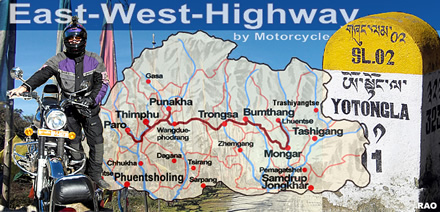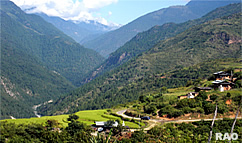|
Trashigang
- Thimphu : From east to west
|
 |
Bhutan's
Economy: Tourism |
 |
Bhutan Information |
|
|
 |
|
East-
West- Highway: Crossing the Country
|

|
| Chamkhar
Valley - Bumthang |
Darkness
has fallen by the time the bus enters Choskhor valley (Bumthang).
Windows are closed to keep out the cold air as some passengers recite prayers.
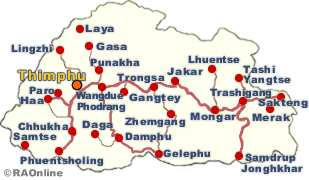 |
There
is a feeling of relief of reaching somewhere. The handy-boy shouts "reporting
time 5 am tomorrow morning." The bus reaches the town by around 7:30 pm,
13 hours after it started from Trashigang.
There are several other buses parked. Some heading east and some to the
west.
There
is a commotion. Tshering the boy who was to get-off at Gayzamchu is still
sleeping and way past his stop. The driver takes him in promising to send
him back the following morning in a Mongar-bound bus. |
|
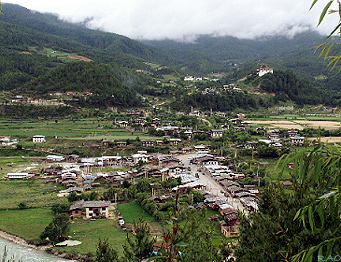 |
| In Bumthang,
the passengers stay in the nearby hotels which are often infested with
lice and bugs and cost Nu. 80 to Nu.120 a room. A passenger travelling
the lateral route needs at least Nu. 800 to reach Thimphu with the bus fare at Nu. 480 and the rest to pay for food and lodge.
It
is an early night for the tired passengers. Passengers don't get to see Bumthang properly as they reach when it is dark and leave when dawn is breaking.
It
is another early morning but a more chilly one. Bumthang is much more colder than Trashigang |
|
Some
women passengers quickly buy Chugo (dried cheese) as the conductor
yells for everyone to get in. At six am, the journey resumes.
 |
| The
driver plays a religious audio tape perhaps influenced by the spiritual
legacy of the valley. Most passengers doze off to catch up on sleep. The
drive from Chamkhar across Chumey valley (Bumthang)which
produces the well known Yathra weave is a pleasant one
After
crossing Yontongla pass at 12,000 feet it gets warmer as the road
descends to Trongsa. Several
kilometres from Trongsa, the
Majestic Trongsa Dzong glittering in the morning sun comes to view. |
|
It's magnificent elongated shape built along the natural contours of the
ridges on which it stands dominates the surrounding hills.
Like Trashigang and Mongar, the Trongsa township clings to the hillsides and the highway. But it wears a new look
with parking space and footpaths - looking clean and tidy. The breakfast
stop in Trongsa at around 9 am, brings in more passengers. Some
carrying luggage that cannot get past the door. Conductor Lepo loads it
at the top.
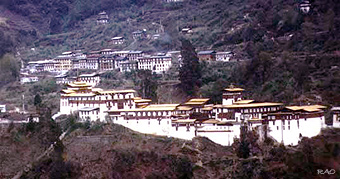 |
There
is another round of inspection by the police at Bjeezam, few kilometers
from Trongsa town.
The
passengers are asked to step out of the bus so that the police officer
can prod the bags, sacks and carton boxes with their rods. A constable
climbs on top to inspect the luggage on the roof carrier. The whole exercise
take over half an hour. |
|
There
are much more vehicles on the highway now. More buses, government vehicles,
private and tourist buses. Except for some music coming through the speakers,
the bus is unusually quiet. Following an un-interrupted drive for the next
five hours, the bus reaches Pelela, another high mountain pass. "There
is so much more movement on this road nowadays," says Pema. "Until recently
people travelled from the south on the Indian highway. Even people from Bumthang and Trongsa travelled via Gelephu to shop in India."
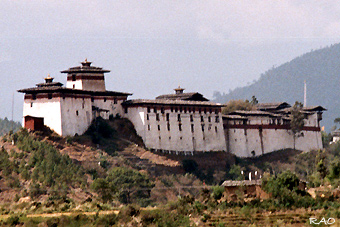 |
| The
second lunchstop of the journey is at Nobding at the foot of Pelela
pass, in a roadside restaurant that serves the same menu, but better
food. Downhill from Nobding, a farmer from Wangduephodrang enters carrying a green military bag with flies hovering around him. He
leaves his bag on the passageway looking for an empty seat. There is a
foul smell and the passengers start complaining "What's in the bag?" conductor
Lepo asks. "Meat" replies the farmer and ignores the complaints. All the
conductor can do is push the bag towards the door. |
|
The
bus reaches Wangduephodrang at
around 3:30 pm but it doesn't stop. Passengers crane neck to look around,
tired of only seeing the looming mountains and thick forest.
The
passengers are aware its only another three hours to Thimphu and conversation picks up. Conversation revolves around relatives and where
they will be staying and what they will do. The climb up to Dochula never
seems to end. "This climb is the worst part of the journey," says Tashi,
the civil servant who is eager to catch up with old friends in Thimphu."
I am going to take a loan and buy a car, he says."
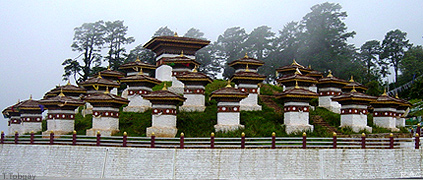 |
Druk Wangyal Chorten
Dochula
Pass |
| The
driver lowers the volume of the music as the bus slowly passes by the newly
built monuments at Dochula pass.
Some passengers fold their hands in prayer, other seeing it for the first
time marvel at the breathtaking structures. |
|
The
descent from Dochula signals the
journey's end as passengers check their belongings and tidy themselves.
SemtokhaDzong comes to view and after a few more turns the bright lights of Thimphu show in the distance. After two days through serene landscapes over hills,
mountains, rivers through cold and hot weather, Thimphu looks out
of the world.
The
traffic is heavy and never ending. At around 7 pm the bus enters the Thimphu bus station. The bus door is opened and the taxi drivers are waiting. 'Babesa,
Semtokha, Khasadrapchu' shout the cab drivers looking expectantly at the
passengers. Angay Dema peers through the window and smiles. Her son and
grandson are waiting to pick her up.
 |
| Contributed
by Samten Wangchuk, Kuensel, Bhutan's National Newspaper, 2006 |
| Information on Bhutan |
 |
|



